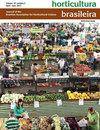利用选择指数筛选甜瓜基因型
IF 0.8
4区 农林科学
Q4 HORTICULTURE
引用次数: 2
摘要
维生素A缺乏症在发展中国家很常见。红薯可以成为扭转这种局面的盟友,因为它的收购成本低,市场可用性高。此外,一些基因型具有橙色果肉根,富含β-胡萝卜素,这是维生素A的前体。因此,本研究的目的是使用两个选择指数(Smith和Hazel以及Mulamba&Mock)来选择橙色果肉红薯基因型。为此,对7个具有橙色果肉根的同父异母兄弟家族(141个实验基因型和商业品种Beaurered)进行了评估,评估了产量相关性状、根的外观、果肉颜色强度和对后筋膜Euscepes postfasciatus的易感性。基因型UZBD-C-14、UZBD-U1-25、UZBD-F-15、UZBD-C-30、UZBD K-32、UZB-D-U1-10、UZBD.L2-14和UZBD-L5-67是最有希望的,表现出更大的平衡性。此外,这些基因型适合进行新的研究,以确认其生产性能和根系质量,并评估证明胡萝卜素介导的调节生物强化特性遗传的生化参数。本文章由计算机程序翻译,如有差异,请以英文原文为准。
Selecting orange-fleshed sweet potato genotypes using selection indices
ABSTRACT Vitamin A deficiency is common in developing countries. Sweet potato can be an ally in reversing this situation since it has a low acquisition cost and high market availability. In addition, some genotypes have orange-flesh roots, rich in beta-carotene, which is the precursor of vitamin A. Thus, the objective of this research was to select orange-fleshed sweet potato genotypes using two selection indices (Smith and Hazel and Mulamba & Mock). For this purpose, seven half-sibling families with orange flesh roots (141 experimental genotypes and the commercial cultivar Beauregard) were evaluated, assessing yield-related traits, external appearance of roots, pulp color intensity, and susceptibility to Euscepes postfasciatus. The genotypes UZBD-C-14, UZBD-U1-25, UZBD-F-15, UZBD-C-30, UZBD-K-32, UZBD-U1-10, UZBD-L2-14, and UZBD-L5-67 were the most promising, showing greater balance for the evaluated characters. Furthermore, these genotypes are suitable for new studies to confirm their productive performance and root quality and evaluate the biochemical parameters that prove the inheritance of the character regulating biofortification mediated by carotenes.
求助全文
通过发布文献求助,成功后即可免费获取论文全文。
去求助
来源期刊

Horticultura Brasileira
农林科学-园艺
CiteScore
1.40
自引率
28.60%
发文量
45
审稿时长
4-8 weeks
期刊介绍:
The journal Horticultura Brasileira, a quarterly journal, is the Official Publication of the Sociedade de Olericultura do Brasil.
Its abbreviated title is Hortic. bras., and it should be used in bibliographies, footnotes, references and bibliographic strips.
 求助内容:
求助内容: 应助结果提醒方式:
应助结果提醒方式:


